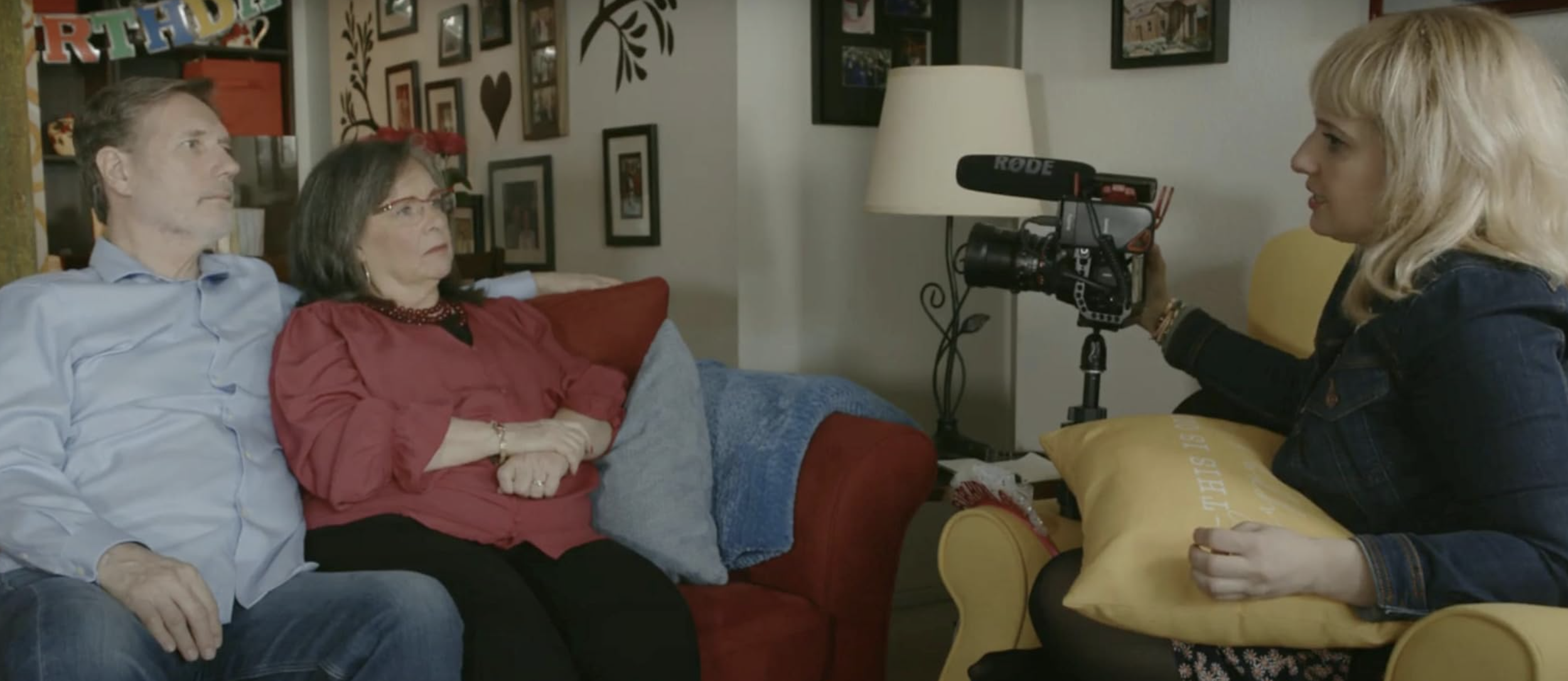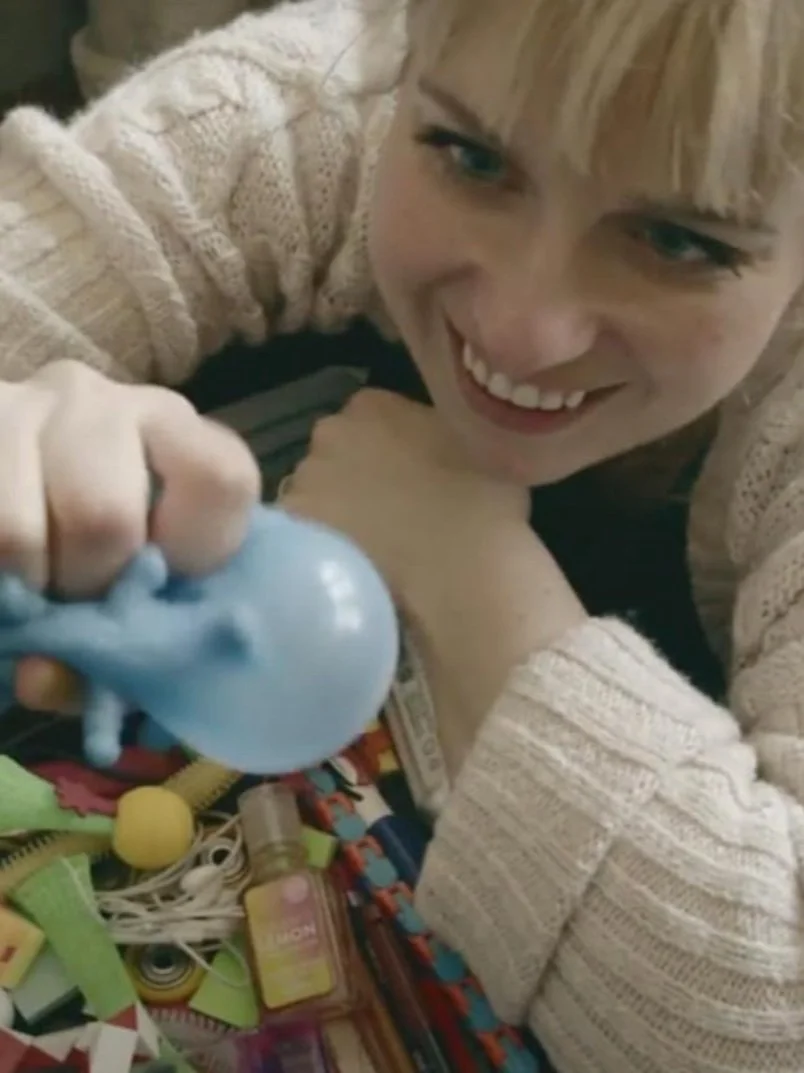At KDocsFF, "Neurodivergent" takes a playful, personal look inside the ADHD mind
Documentary filmmaker Afton Quast Saler turned a camera on herself and her family to explore why she and other women are so often underdiagnosed
Filmmaker Afton Quast Sale digs into her past with her parents.
KDocsFF screens “Neurodivergent” with Is There Anybody Out There? at the Vancity Theatre on February 21 at noon, with the filmmaker in attendance
AFTER APPEARING IN his daughter’s autobiographical film “Neurodivergent”, probably the most delightful short ever made about Attention-Deficit/Hyperactivity Disorder (ADHD), Gerry Quast was himself diagnosed with the condition.
“He went in and he said, ‘I have a lot of these symptoms,’” says Afton Quast Saler of her 73-year-old dad, who, in the style of his generation, just quietly “managed” his mysterious condition. “He’s very intelligent and you find ways to deal with it. It was interesting because I think it helped him and my mother because she could see, ‘Oh, he’s not doing that on purpose.’ There were so many things that she never understood because her brain doesn’t work like that.”
Quast Saler’s sun-drenched Pasadena apartment fills the background when the filmmaker reaches Stir via Zoom. It’s immediately familiar after a screening of her very intimate doc, in which she grapples with a lifelong mental health issue that was finally diagnosed during the pandemic. With little else to do, Quast Saler turned the camera on herself and produced her thesis work for the University of Southern California. Husband Jesse and her parents lend their perspective, as does psychotherapist Sari Solden, author of 2005’s groundbreaking Women With Attention Deficit Disorder.
Aided by animation and general sense of playfulness—“I realize that ADHD might not be the most exciting topic, so let’s add some animation and maybe people will listen,” quips Quast Saler—the documentary manages to convey the experience of a mind evocatively described in the film as “a junk drawer emptied onto a trampoline”. Recalls the filmmaker: “This woman came up to me after screening and she says, ‘Is that what your brain is like? It was really hard to watch.’ But I’m glad I conveyed this sort of hectic-ness. It’s like collage art.”
Crucially, “Neurodivergent” is anything but “hard to watch”. It's buoyant and engaging, even as Quast Saler and her family discuss some very dark territory from her youth.
“My parents were frustrated with themselves that they missed certain things,” she says. “Which I don’t think is fair because everyone did. It [ADHD] wasn’t and still isn’t necessarily talked about and dealt with in girls. It manifests itself so differently, and it’s hard to know what to do for someone. Your kid’s struggling, what do you do? You can only try to make it as easy as you can for them. But it was also really wonderful for our relations and my relationship with my husband to be able to understand a little bit more. All of us were learning at the same time. No one did anything wrong.”
Like his wife, Jesse Saler’s work as a “sometime performer” means he’s already comfortable on camera, and we get to watch his reaction to the aftermath of the diagnosis—mostly compassionate, sometimes frustrated—in something like real time, augmented by his own lifelong experience of Obsessive Compulsive Disorder. He’s a fabulous surrogate for the viewer, as the filmmaker well knows.
“Oh man,” she says, with a laugh, “middle-aged women love Jesse. At screenings they go up to him and tell him: ‘You are the best husband on the planet.’ I just think: ‘You got a good edit.’ But we both understand a struggle of some sort with your brain, where you’re like, ‘I want to help with this but I can’t.’ He gets it, and that’s what gives him grace and patience. But man—we filmed everything in our house for about a month. It very much consumed our lives. It got tense. There were times when he was, like, ‘We’re done.’”
Happily, everyone survived, and “Neurodivergent” has since emerged as a festival hit and one hell of a calling card for Quast Saler, whose witty shorts can be previewed at her website (www.aftonquastsaler.com). At the risk of romanticizing a sometimes crippling mental health issue that brings chaos to the inner life of the sufferer, Quast Saler’s talents might illuminate an upside to ADHD.
“Absolutely,” she says. “Creativity. Thinking outside the box. Now I see it as something that is special. I also think that it gives you a certain amount of depth and empathy when you’ve struggled. You can connect with people in a different way. Because everybody’s gone through something.”















